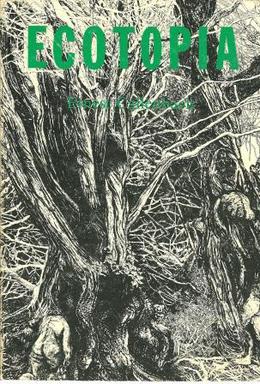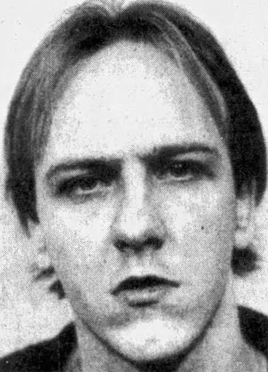Plot summary
In the story a man is executed for driving a car in a futuristic London where environmental correctness has run rampant. The citizens suffer under the Dark Green totalitarian regime where the party prohibits alcohol, cars, tobacco and all other luxury goods that contribute to the pollution of the planet. People who do not follow the rules of the government are executed or brought to the Dark Green Re-education Centre in Mid-Wales where they perform various duties such as dusting off leaves day after day, cleaning out badger setts and nursing cattle.
The main character of the story, Arnold Watney, intrigues against the Dark Green government and puts up secret resistance against it by owning a car (which is called Mabel the Morris Minor and hidden under a sheet in his lounge at home), smoking cigarettes and drinking his home-brew beer.
While watching the execution of a car driver (Dr Stone), Watney realises how dangerous his violations of the Dark Green laws are. Therefore, he secretly dumps his beloved Morris Minor into a pond and confesses his drinking and smoking habits to the Dark Green Cell, who sends him to the Re-education Centre.
After three weeks of re-educational treatment, the Dark Greens are overthrown. Besides Watney, many other people have hidden their cars. However, it turns out that the news of the overthrow has only been a clever strategy of the Dark Green government to rouse cars from their hiding places. The owners of the cars have to bear the consequences of their disobedience and "up and down the country" people are killed by the government.
Capital punishment, also known as the death penalty and formerly called judicial homicide, is the state-sanctioned killing of a person as punishment for actual or supposed misconduct. The sentence ordering that an offender be punished in such a manner is known as a death sentence, and the act of carrying out the sentence is known as an execution. A prisoner who has been sentenced to death and awaits execution is condemned and is commonly referred to as being "on death row". Etymologically, the term capital refers to execution by beheading, but executions are carried out by many methods, including hanging, shooting, lethal injection, stoning, electrocution, and gassing.
A utopia typically describes an imaginary community or society that possesses highly desirable or near-perfect qualities for its members. It was coined by Sir Thomas More for his 1516 book Utopia, which describes a fictional island society in the New World.

Punishment, commonly, is the imposition of an undesirable or unpleasant outcome upon a group or individual, meted out by an authority—in contexts ranging from child discipline to criminal law—as a response and deterrent to a particular action or behavior that is deemed undesirable or unacceptable. It is, however, possible to distinguish between various different understandings of what punishment is.

Ecotopia: The Notebooks and Reports of William Weston is a utopian novel by Ernest Callenbach, published in 1975. The society described in the book is one of the first ecological utopias and was influential on the counterculture and the green movement in the 1970s and thereafter. The author himself claimed that the society he depicted in the book is not a true utopia, but, while guided by societal intentions and values, was imperfect and in-process.

Smoking bans, or smoke-free laws, are public policies, including criminal laws and occupational safety and health regulations, that prohibit tobacco smoking in certain spaces. The spaces most commonly affected by smoking bans are indoor workplaces and buildings open to the public such as restaurants, bars, office buildings, schools, retail stores, hospitals, libraries, transport facilities, and government buildings, in addition to public transport vehicles such as aircraft, buses, watercraft, and trains. However, laws may also prohibit smoking in outdoor areas such as parks, beaches, pedestrian plazas, college and hospital campuses, and within a certain distance from the entrance to a building, and in some cases, private vehicles and multi-unit residences.
Capital punishment in Canada dates to Canada's earliest history, including its period as first a French then a British colony. From 1867 to the elimination of the death penalty for murder on July 26, 1976, 1,481 people had been sentenced to death, and 710 had been executed. Of those executed, 697 were men and 13 women. The only method used in Canada for capital punishment of civilians after the end of the French regime was hanging. The last execution in Canada was the double hanging of Arthur Lucas and Ronald Turpin on December 11, 1962, at Toronto's Don Jail. The National Defence Act prescribed the death penalty for certain military offences until 1999, although no military executions had been carried out since 1946.
Benson & Hedges is a British brand of cigarettes owned by American conglomerate Altria. Cigarettes under the Benson & Hedges name are manufactured worldwide by different companies such as Rothmans, Benson & Hedges, Philip Morris USA, British American Tobacco, or Japan Tobacco, depending on the region. In the UK, they are registered in Old Bond Street in London, and were manufactured in Lisnafillan, Ballymena, Northern Ireland, before production was moved to Eastern Europe in 2017.
The human rights record of North Korea is often considered to be among the worst in the world and has been globally condemned, with the United Nations and groups such as Human Rights Watch having condemned it. Amnesty International considers North Korea to have no contemporary parallel with respect to violations of liberty.

Lesbian, gay, bisexual, and transgender (LGBT) people in Iran face severe challenges not experienced by non-LGBT residents. Sexual activity between members of the same sex is illegal and can be punishable by death, and people can legally change their assigned sex only through sex reassignment surgery. Currently, Iran is the only country confirmed to execute gay people, though death penalty for homosexuality might be enacted in Afghanistan.

Utopia is a work of fiction and socio-political satire by Thomas More (1478–1535), written in Latin and published in 1516. The book is a frame narrative primarily depicting a fictional island society and its religious, social and political customs. Many aspects of More's description of Utopia are reminiscent of life in monasteries.

In criminology, public-order crime is defined by Siegel (2004) as "crime which involves acts that interfere with the operations of society and the ability of people to function efficiently", i.e., it is behaviour that has been labelled criminal because it is contrary to shared norms, social values, and customs. Robertson (1989:123) maintains a crime is nothing more than "an act that contravenes a law". Generally speaking, deviancy is criminalized when it is too disruptive and has proved uncontrollable through informal sanctions.

James Terry Roach was the second person to be executed by the state of South Carolina following the 1976 decision by the U.S. Supreme Court reauthorizing the use of capital punishment by the states. He was electrocuted on January 10, 1986, aged 25, nearly a year to the day following the electrocution of his accomplice, Joseph Carl Shaw, on January 11, 1985, at the Central Correctional Institution in Columbia. Roach was executed for a crime he committed at age 17.
Capital punishment is a legal penalty in Pakistan. Although there have been numerous amendments to the Constitution, there is yet to be a provision prohibiting the death penalty as a punitive remedy.

An excise, or excise tax, is any duty on manufactured goods that is normally levied at the moment of manufacture for internal consumption rather than at sale. It is therefore a fee that must be paid in order to consume certain products. Excises are often associated with customs duties, which are levied on pre-existing goods when they cross a designated border in a specific direction; customs are levied on goods that become taxable items at the border, while excise is levied on goods that came into existence inland.
Social dangerousness is a category of anti-social behaviour on the basis of detectors of dangerousness that enable the judicial authorities to justify the need for a particular control by the police authorities.

A dystopia, also called a cacotopia or anti-utopia, is a community or society that is extremely bad or frightening. It is often treated as an antonym of utopia, a term that was coined by Sir Thomas More and figures as the title of his best known work, published in 1516, which created a blueprint for an ideal society with minimal crime, violence, and poverty. The relationship between utopia and dystopia is in actuality, not one simple opposition, as many utopian elements and components are found in dystopias as well, and vice versa.
Prisons in North Korea have conditions that are unsanitary, life-threatening and are comparable to historical concentration camps. A significant number of inmates have died each year, since they are subject to torture and inhumane treatment. Public and secret executions of inmates, including children, especially in cases of attempted escape, are commonplace. Infanticides also often occur. The mortality rate is exceptionally high, because many prisoners die of starvation, illnesses, work accidents, or torture.

Naraka, also called Yamaloka, is the Hindu equivalent of Hell, where sinners are tormented after death. It is also the abode of Yama, the god of Death. It is described as located in the south of the universe and beneath the earth.

Solarpunk is a literary and artistic movement that envisions and works toward actualizing a sustainable future interconnected with nature and community. The "solar" represents solar energy as a renewable energy source and an optimistic vision of the future that rejects climate doomerism, while the "punk" refers to do it yourself and the countercultural, post-capitalist, and decolonial aspects of creating such a future.









